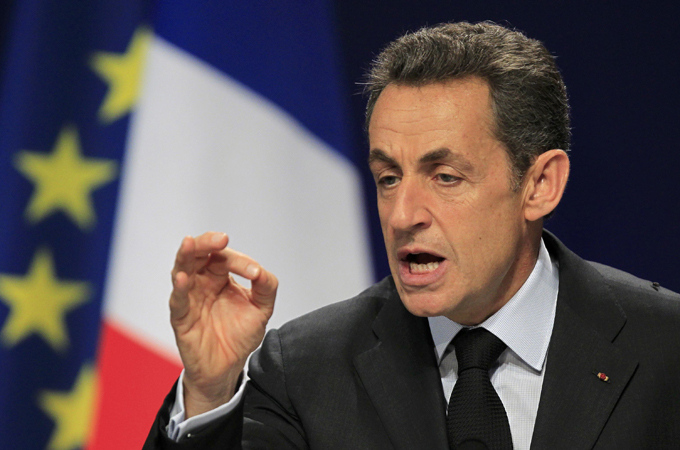France to announce deep budget cuts
Expected $11bn in spending cuts and tax increases aimed at keeping finances under control and boost credit rating.

 |
| France has experienced demonstrations and strikes by a public angry at the imposition of cutbacks [File: AFP] |
The French government is expected to announce up to $11bn in spending cuts and tax increases, to boost its credit rating and rein in its deficit.
The move is being seen as a major gamble for President Nicolas Sarkozy, six months before an election.
Keep reading
list of 4 itemsA good, steady job? India election turns spotlight on a dream gone sour
Photos: Iran’s unravelling carpet sales
Biden labels Japan and India ‘xenophobic’ along with China and Russia
His government says extra savings are urgently needed to keep France’s finances under control, since it cut its growth forecast for next year to one per cent from 1.75 per cent last week.
The cuts, which Francois Fillon, the French prime minister, is expected to announce at 11:00 GMT on Monday, come on top of $16bn in savings the government announced just three months ago.
|
“The French government has really got to impose the austerity measures because it has to contribute so much to the eurozone’s bailout fund“ – Louise Cooper, BGC financial analyst |
Louise Cooper, a senior financial analyst at the BGC Partners group in London, told Al Jazeera “there is an awful lot of things for investors to be worried about and to cause market volatility” across Europe.
“Greece is just one of many worries. At the moment the European stock markets are indicated to open slightly lower, about 12 points down on [London’s] FTSE [index] about 20 points down on [Germany’s] DAX [stock index],” she said.
“The name of the game is definitely volatility – there are an awful lot of things to digest over the next 24 hours.
“First of all, we still don’t know what the unity government in Greece is going to look like. We know that the Greek prime minister has resigned but we don’t know what George Papandreou will be replaced by,” she said.
“Secondly, we’ve got austerity measures from France today. [French President] Nicolas Sarkozy is terribly concerned about losing his triple-A rating, so he has come out with new budgetary measures to try to get France’s finances back in control.”
Finally, Cooper said, “the eurozone finance ministers meeting will also take place later on Monday, to look at ways of boosting the power of the bailout fund – the EFSF [European Financial Stability Fund]”.
‘Hour of truth’
Like other European countries struggling with public finances, France has experienced demonstrations and strikes by a public angry at the imposition of spending cuts during hard times.
Ratings agencies have been hinting they could cut France’s prized top credit rating because of its slowing growth and its potential liability for the cost of bailouts in the European debt crisis.
 |
| Budget cuts come at a politically sensitive moment for Sarkozy, whose popularity ratings are low [Reuters] |
Without mentioning the word “austerity”, ministers from Sarkozy’s centre-right government spent the weekend defending the need for fiscal vigiliance.
“The 2012 budget will be one of the most rigorous budgets that France has seen since 1945,” Fillon announced on Saturday, stating that France’s “hour of truth has arrived”.
Ministers have given no concrete details on where the cuts would come from, but said they would be “equitable”.
Francois Baroin, the French finance minister, told the RTL radio station on Sunday the measures would be balanced evenly between spending cuts and tax rises.
The Les Echos newspaper reported on Sunday that the transition to France’s higher retirement age of 62 would now take place in 2016 or 2017, rather than 2018.
Securing a rise in the retirement age to 62 from 60 was a key political victory last year – but a highly unpopular move – for Sarkozy, who said it was necessary to keep France’s ballooning pension deficit in check.
Speeding it up would mean saving billions in coming years by delaying payments to retirees.
Budget gamble
The newspaper Journal du Dimanche reported that Sarkozy’s government could also raise the value added tax (VAT) rate in certain sectors from 5.5 per cent to 7.0 per cent, reversing an earlier policy to lower it.
The government might also place a corporate tax on businesses with annual revenues exceeding $68bn, the paper said.
|
“[Raising the VAT rate so soon after lowering it would be] “the proof of inconstancy, political incoherence“ – Francois Hollande, |
Baroin denied speculation about an additional “day of solidarity” from workers, the pay for which will go to the state.
France is trying to reduce its budget gap from 5.7 per cent of Gross Domestic Product (GDP) this year to 4.5 per cent next year. It hopes to reach an EU-mandated limit of three per cent of GDP by 2013.
Preserving France’s coveted AAA credit rating through deficit reduction plans has been an important goal of Sarkozy, who in recent months has cast himself as a responsible leader amid the turmoil of the seemingly unending eurozone crisis.
“Because France is the second biggest cheque-writer for the EFSF, it has to contribute around $150bn to the bailout fund, and it’s that cost that is basically putting the triple-A rating in France in peril and at the same time undermining the EFSF, because it needs more than one triple-A rated government backing it, so it needs both France and Germany,” Cooper told Al Jazeera.
“Hence the French government has really got to impose austerity measures because it has to contribute so much to the eurozone’s bailout fund.”
The cuts come at a politically sensitive time for Sarkozy, whose popularity ratings are low six months from a presidential election in which he is widely expected to seek a second term.
His expected Socialist presidential challenger, Francois Hollande, said on Saturday that raising the VAT rate so soon after lowering it would be “the proof of inconstancy, political incoherence”.